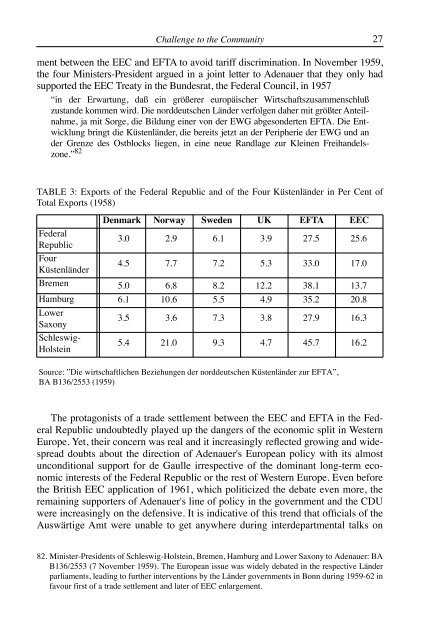26Wolfram KaiserThe BDI subsequently also opposed acceleration in spring 1960. 77 According toone report <strong>of</strong> a conversation between Berg and Schaffner, the BDI at one point eventhreatened to withhold campaign funds from the CDU. 78 The BDI position wasalso supported, among others, by the influential Speaker <strong>of</strong> the Executive Board <strong>of</strong>the Deutsche Bank, Hermann Josef Abs, who argued in a personal letter to A<strong>de</strong>nauerthat it was wrong and politically dangerous to believe that the intensification<strong>of</strong> tra<strong>de</strong> relations with third countries could wait. 79The opponents <strong>of</strong> A<strong>de</strong>nauer's one-si<strong>de</strong>d emphasis on close Franco-German relationscould point not only to the Fe<strong>de</strong>ral Republic's extensive tra<strong>de</strong> with the EFTAstates, which equalled that with its EEC partners, but also to its substantial surplusin this tra<strong>de</strong>. In 1960-1 all EFTA states recor<strong>de</strong>d <strong>de</strong>ficits in their tra<strong>de</strong> with the EECtotalling 2.2 billion US dollars, 80 <strong>of</strong> which more than half resulted from their tra<strong>de</strong>with the Fe<strong>de</strong>ral Republic. Significantly, these German surpluses were far in excess<strong>of</strong> those the Fe<strong>de</strong>ral Republic recor<strong>de</strong>d in tra<strong>de</strong> with its EEC partners. The EconomicsMinistry was less concerned about the effects <strong>of</strong> EFTA on German tra<strong>de</strong>with Austria and Switzerland, where German industry possessed important non-tariffadvantages over its British or Scandinavian competitors, such as its long-standingtra<strong>de</strong> contacts, language and geographical proximity. In contrast, the EconomicsMinistry calculated that German exports to Swe<strong>de</strong>n and Norway <strong>–</strong> primarily inmotorcars, electrical equipment, machine tools and chemicals <strong>–</strong> could be replacedby British, Swedish or Swiss products. Thus, exports to Scandinavia would sufferfrom rising tariff barriers, as would German exports to Britain. Moreover, the EconomicsMinistry assumed that the German negotiating position vis-à-vis the EFTAstates was weak because in tra<strong>de</strong> policy <strong>–</strong> as one <strong>of</strong>ficial put it <strong>–</strong> “it was not the surplus,but the <strong>de</strong>ficit partner who had the greater leverage”. 81Another facet <strong>of</strong> the intensifying public <strong>de</strong>bate about the Fe<strong>de</strong>ral Republic's longtermeconomic interests was the regional disparity in tra<strong>de</strong> patterns. As Table 3 shows,the North German Län<strong>de</strong>r had a much greater stake in tra<strong>de</strong> with the EFTA states.While 27.5 per cent <strong>of</strong> total German exports went to the EFTA states and 25.6 percent to the EEC in 1958, the figures for the four so-called Küstenlän<strong>de</strong>r in the northwere 33 per cent and 17 per cent respectively. Of their total exports, in Schleswig-Holstein 45.7 per cent went to EFTA states, in Bremen 38.1 per cent, in Hamburg35.2 per cent and in Lower Saxony 27.9 per cent. These Län<strong>de</strong>r also had very closecultural ties both with Scandinavia and with Britain. As a result, the parliaments andgovernments <strong>of</strong> the four Küstenlän<strong>de</strong>r <strong>–</strong> <strong>of</strong> which Schleswig-Holstein was at that timegoverned by the CDU un<strong>de</strong>r Minister-Presi<strong>de</strong>nt Kai-Uwe von Hassel <strong>–</strong> <strong>de</strong>man<strong>de</strong>dfrom the government in Bonn that absolute priority be given to securing a tra<strong>de</strong> settle-77. Berg to A<strong>de</strong>nauer: BA B136/2553 (11 March 1960).78. Note Holliday on talks Schaffner-Berg: PRO FO 371/150161/191 (12 May 1960).79. Abs to A<strong>de</strong>nauer: BA B136/2553 (14 November 1959).80. EFTA, EFTA's Foreign Tra<strong>de</strong> During the First Year <strong>of</strong> Operation, 1st July 1960 <strong>–</strong> 30th June 1961,Geneva 1962, p.19.81. Meyer-Cording to Carstens: PA AA/353/Ref. 200-I A2 (16 July 1959).
Challenge to the Community 27ment between the EEC and EFTA to avoid tariff discrimination. In November 1959,the four Ministers-Presi<strong>de</strong>nt argued in a joint letter to A<strong>de</strong>nauer that they only hadsupported the EEC Treaty in the Bun<strong>de</strong>srat, the Fe<strong>de</strong>ral Council, in 1957“in <strong>de</strong>r Erwartung, daß ein größerer europäischer Wirtschaftszusammenschlußzustan<strong>de</strong> kommen wird. Die nord<strong>de</strong>utschen Län<strong>de</strong>r verfolgen daher mit größter Anteilnahme,ja mit Sorge, die Bildung einer von <strong>de</strong>r EWG abgeson<strong>de</strong>rten EFTA. Die Entwicklungbringt die Küstenlän<strong>de</strong>r, die bereits jetzt an <strong>de</strong>r Peripherie <strong>de</strong>r EWG und an<strong>de</strong>r Grenze <strong>de</strong>s Ostblocks liegen, in eine neue Randlage zur Kleinen Freihan<strong>de</strong>lszone.”82TABLE 3: Exports <strong>of</strong> the Fe<strong>de</strong>ral Republic and <strong>of</strong> the Four Küstenlän<strong>de</strong>r in Per Cent <strong>of</strong>Total Exports (1958)Fe<strong>de</strong>ralRepublicFourKüstenlän<strong>de</strong>rDenmark Norway Swe<strong>de</strong>n UK EFTA EEC3.0 2.9 6.1 3.9 27.5 25.64.5 7.7 7.2 5.3 33.0 17.0Bremen 5.0 6.8 8.2 12.2 38.1 13.7Hamburg 6.1 10.6 5.5 4.9 35.2 20.8LowerSaxony3.5 3.6 7.3 3.8 27.9 16.3Schleswig-Holstein5.4 21.0 9.3 4.7 45.7 16.2Source: ”Die wirtschaftlichen Beziehungen <strong>de</strong>r nord<strong>de</strong>utschen Küstenlän<strong>de</strong>r zur EFTA”,BA B136/2553 (1959)The protagonists <strong>of</strong> a tra<strong>de</strong> settlement between the EEC and EFTA in the Fe<strong>de</strong>ralRepublic undoubtedly played up the dangers <strong>of</strong> the economic split in WesternEurope. Yet, their concern was real and it increasingly reflected growing and wi<strong>de</strong>spreaddoubts about the direction <strong>of</strong> A<strong>de</strong>nauer's <strong>European</strong> policy with its almostunconditional support for <strong>de</strong> Gaulle irrespective <strong>of</strong> the dominant long-term economicinterests <strong>of</strong> the Fe<strong>de</strong>ral Republic or the rest <strong>of</strong> Western Europe. Even beforethe British EEC application <strong>of</strong> 1961, which politicized the <strong>de</strong>bate even more, theremaining supporters <strong>of</strong> A<strong>de</strong>nauer's line <strong>of</strong> policy in the government and the CDUwere increasingly on the <strong>de</strong>fensive. It is indicative <strong>of</strong> this trend that <strong>of</strong>ficials <strong>of</strong> theAuswärtige Amt were unable to get anywhere during inter<strong>de</strong>partmental talks on82. Minister-Presi<strong>de</strong>nts <strong>of</strong> Schleswig-Holstein, Bremen, Hamburg and Lower Saxony to A<strong>de</strong>nauer: BAB136/2553 (7 November 1959). The <strong>European</strong> issue was wi<strong>de</strong>ly <strong>de</strong>bated in the respective Län<strong>de</strong>rparliaments, leading to further interventions by the Län<strong>de</strong>r governments in Bonn during 1959-62 infavour first <strong>of</strong> a tra<strong>de</strong> settlement and later <strong>of</strong> EEC enlargement.
















